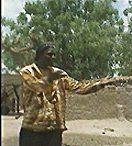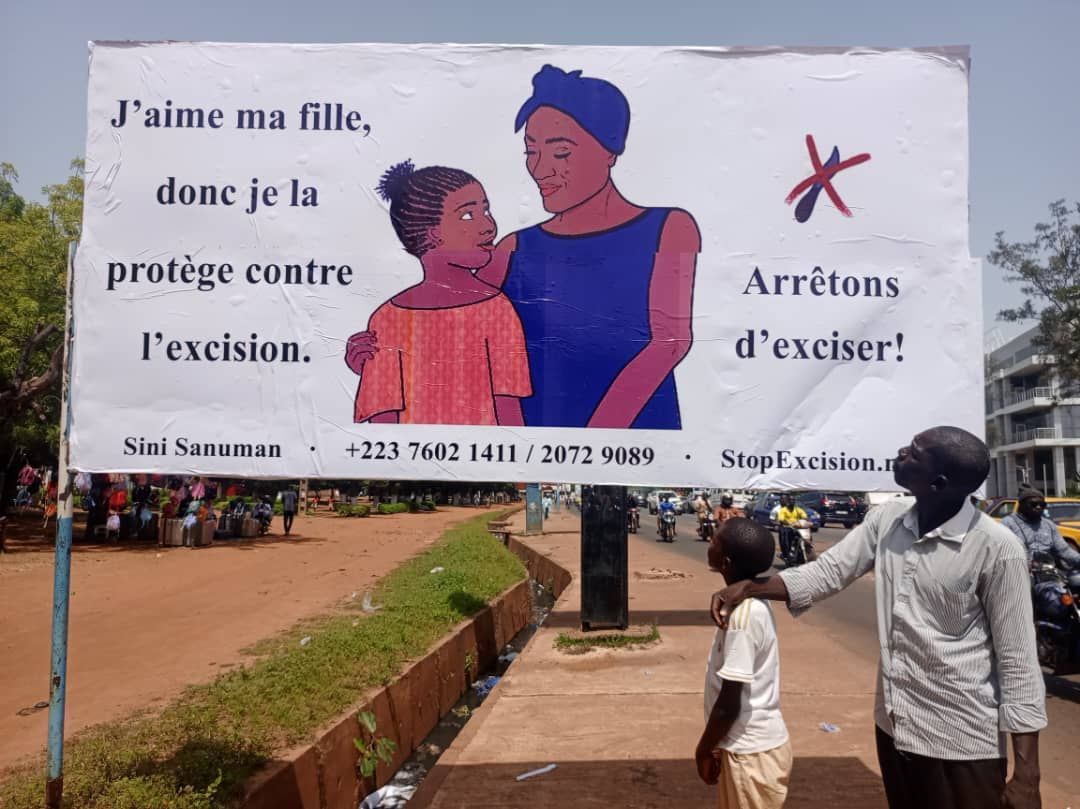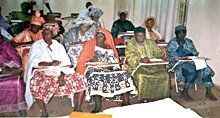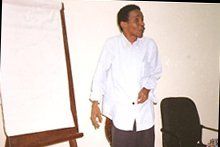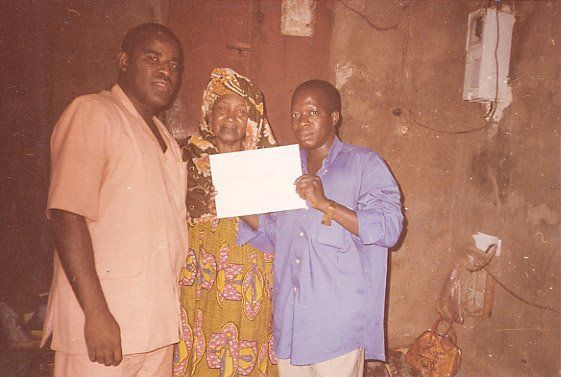back to menu
Our Work
Sini Sanuman works in Mali, West Africa, to convince parents not to have their daughters excised, and excisers to stop excising.
We are delighted to announce that Mali finally has a law against FGM, as of December 2024. It doesn't name FGM in the Penal Code, but it outlaws sexual violence and the government affirms that FGM is part of sexual violence. The Penal Code out-laws sexual violence and the government assures us that FGM is sexual violence. This certainly doesn’t obviate the need for our advocacy, but it really helps. We are working now to spread the news that FGM is no longer allowed.
This is the new section of the Penal Code that outlaws FGM. It's Article 327-2, 3rd and 4th paragraphs.
The document that proves that FGM is sexual violence is the Women's Ministry's National Holistic Strategy to put an end to Gender Based Violence - 2019 - 2030, page 16. See the poster below, with pictures of it up in Bamako.
This is an article in a major Malian newspaper, Les Echos, talking about the law.
Our work involves many public meetings, sometimes with whole villages, and we also use the mass media a lot.
We have convinced 170 excisers to stop excising, as of January 2025. For many of them, we've helped them start new businesses and many of them have become important spokespeople in our movement., explaining to potential clients why they have stopped and encouraging other excisers to also stop.
Twenty two villages have made collective decisions to stop cutting their girls and signed Declarations to that effect. Almost all of them celebrated the decision with a ceremony, most of which were televised. See the list in the Village Decisions section below.
The list that we started through the women's ministry has over 1,400 villages on it now that various NGO's have convinced to stop FGM.
We have collected over 85,00 signatures on our Pledge Against Excision and another 3,000 on the newer Pledge against Gender-based Violence.
We submitted signatures to the legislature twice now, in 2007 and 2015, encouraging them to pass a law.
We also use music and dance to spread the message, with an album Stop Excision, and 5 music videos that we often put on the air.
We also sometimes help girls and women dealing with medical troubles related to their FGM.
We operate from our office in Bamako, Mali.
Susan speaking at Community Church, Boston, Feb., 2023.
(Click image above to watch)
Besides its ongoing work, which is described in more detail below, the following are recent accomplishments and projects of Sini Sanuman.
May 2025 - We started putting up a poster announcing the new law against FGM. Here is the poster and some of the pictures of it up around Bamako.



October 2024 - Our new building, the House of Hope, was finished in October 2024 and Sini Sanuman moved into it. It isn’t just our office, but also a medical office and a training center for income generating activities (sewing, for now). We are working on setting up a safe house for girls and women to escape gender-based violence: excision, forced or early marriage and rape, as well as victims of GBV, and an internet café. We thank Close to Africa, the Hungarian government and Richter Gedeon for making this dream come true.
In the middle below, our president Siaka Traoré (in orange) is getting the keys from the architect, Guy Lipem Laurent. On the right, Ousmane Traoré, the son of Seydou Traoré, who gave us the land to build on, looks onto the courtyard from the second floor.
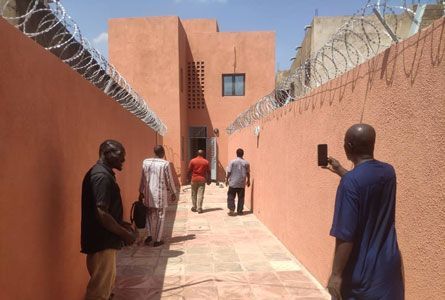

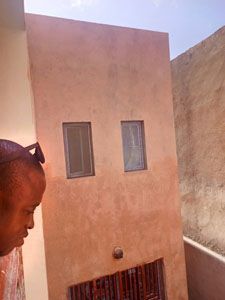
October 2024 - Sini Sanuman produced a radio show that Radio Guintan broadcast at least 3 times featuring an ex-exciser who got in trouble with the police when she wasn't able to pay for the medical treatment of a girl she had cut before stopping.
Daffa Kanté was kept in jail for 3 days until she came up with the money. The mother of the girl, the doctor who treated her, Kaniba Baguiya, the activist who convinced her to stop and Daffa Kanté were all interviewed and made impassioned pleas for people to stop subjecting their girls to FGM.
On the right, is Daffa Kanté getting her Certificate of Honor (for having stopped) from Kaniba Baguiya, in September 2024.

On November 30, 2024, the village of Sibiribougou gathered to mark their decision to no longer cut the girls of the village, with the punishment, if anyone did it, being barred from getting water at either of the 2 springs in the village

On April 29, 2024, the villages of Diakoni, Djinidié, Chobougou and Sirakoro Dounfing gathered to mark their decision to stop excising in their villages. They signed a Declaration which includes a fine of $130 for anyone who goes against the decision.
In a consortium with our partner groups ADICO (Association pour le Developpement de l'Initiative Communautaire) and COFESFA (Collectif des Femmes pour l'Education, la Sante Familiale et l'Assainissement) called JIGIFA (Satisfaction), Sini Sanuman is treating 100 victims of FGM and broadcasting on the radio against FGM in the project zones of Sikassa, Ségou, Mopti, Koulikoro, and Kayes with aid from the World Bank and SWEDD. The project started in October 2022 and is ongoing.
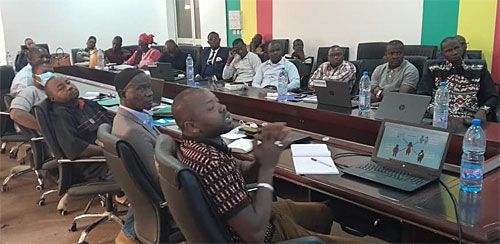
Seminar of leaders from the different villages in Kayes, at the start of the project SWEDD, February 2023.

Small group at the seminar of leaders from the different villages in Koulikoro at the start of the project SWEDD, February 2023.
We put a new billboard up in SIkasso by the circle of the "Direction Régionale de la Santé" and redid the billboard by the Awa Keita Center in Bamako, in 2023.

The billboard in Sikasso.

The billboard in Bamako.
Sini Sanuman held public meetings about FGM in Sans Fil, a neighborhood in District II of Bamako in 2020. We spoke to women’s groups and at schools, and health centers about excision and other forms of GBV. Because of this work, two excisers renounced the profession and found new work with our help. In May 2023, we presented about FGM and GBV to religious and traditional leaders; support from Close to Africa (Proche Afrique).
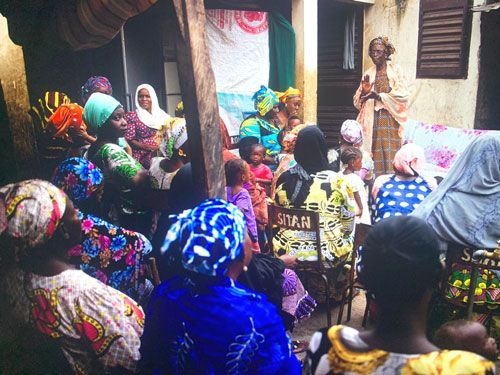
One of the meetings at Sans Fil

Mariam Ballo, one of the two excisers who stopped excising because of our work in Sans Fil, with Fanta Keita and her Certificate of Honor and her new work
Fifty victims/survivors of FGM and other forms of GBV were trained by Sini Sanuman in the management of resources and supported in developing paid work so they would be independent; financed by the UN Population Fund in October 2021.

Sini Sanuman educated government officials about integrating the concerns of women into all programs and budgeting processes. Seven ministries—Justice, Women, Education, Solidarity, Religion, Health and Social Action, Territorial Administration—as well as the National Assembly and other governmental agencies were trained in the zones of Sikasso and Segou and Districts I, III, and VI of Bamako. The project was financed by the UN Development Program in 2020-21.

Also in 2020-2021, with aid from the World Bank through the Malian Ministry of Finances, in the zones of Konna in Mopti and Ansongo in Gao, Sini Sanuman conducted the activities below:
- trained health care providers in the clinical care of survivors of FGM and other gender-based violence (GBV);
- educated community leaders and teachers about the problems associated with FGM and other GBV such as rape and sexual abuse and harassment;
- trained community leaders and staff of projects on how to initiate a lawsuit about GBV;
- produced radio programs that activate for stopping excision and other GBV;
- created and displayed posters listing services available to survivors such as health care, counseling, legal help, security and housing;
- created and displayed posters against FGM.
In 2019 and 2020, we did a lot of media, showing a video we'd made of legislators speaking out in favor of a law against FGM in Mali 6 times, showing the trailer for "In the Name of Your Daughter" 10 times and showing the whole film twice. Watch trailer here.
Pledge Against Excision



Public Meetings
Our biggest public meeting so far was in April 2015, a competition in a stadium in District I with about 3,000 people attending. Students who had worked with Sini Sanuman in 16 schools, shared their theater skits, poems and drawings against FGM and violence against women. There was also a soccer match. Speeches were made by dignitaries including the president of Sini Sanuman Siaka Traoré. The national TV station put it on the nightly news.


Village Decisions
The people of Kouralé wrote their Declaration, which they signed at a village gathering on May 3, 2019.
After over a year of meetings run by Sini Sanuman activist Kaniba Baguiya, the village of Taliko 2 had a celebration of their decision to stop cutting their girls on June 25, 2023. It rained hard that day so the celebration was cut short but people got to eat and hear the main message, including the Declaration that had been agreed on by the leaders of the village. Their Declaration includes a hefty fine for anyone who might go against the will of the village and excise their girl. See photo at right of the leaders of women and of youth holding the Declaration of Taliko 2.
With Kaniba Baguiya taking the lead again, and after two years of meetings, Koyambougou and Djédjéni held their joint ceremony of abandoning FGM on September 24, 2023 with around 1,000 people in attendance. The village chief of both villages spoke, as did the leaders of women and youth. Three ex-excisers spoke and said how happy they were to no longer be hurting girls and a chorus of girls, who had all been spared from FGM through the efforts of Kaniba, sang "Leave Her Alone" in Bambara. The photo at the right is of Assa Sissoko, a woman who works at the townhall of Koyambougou, who called Kaniba to start the discussions that led to these decisions and helped her organize all the meetings.
In 2023, 3 villages celebrated their decision to no longer excise their girls: Taliko 2 in June and Koyambougou and Djédjéni in September. Kaniba Baguiya conducted all the meetings that led up to these decisions. Here are the girls who sang "Leave Her Alone" and danced at the ceremony in Koyambougou, happy that they had not been cut. Read about earlier village decisions here.
Below is an ex-exciser, Barama Kanté, who came to testify at the ceremony in Koyambougou and say how happy she felt to no longer be hurting girls. Aside from Barama, 3 other excisers also gave up the practice with our encouragement in 2023. One of them, Korotoumou Kané, was about to excise the daughter of a friend of our president Siaka Traoré's. When he stopped to say hello, and realized what was going on, he convinced everyone to stop, saving 4 girls from being cut in that conversation.


On April 29, 2024, the villages of Diakoni, Chobougou, Djinidié and Sirakoro Dounfing celebrated their decision to stop excising with about 400 people in attendance. They listened to the village leaders, an ex-exciser, and a woman that we had saved after a very difficult childbirth. They feasted and danced and sang with the organizer Kaniba Baguiya, pictured at right with the mayor of Kati.
On November 30, 2024, the village of Sibiribougou gathered to mark their decision to no longer cut the girls of the village, with the punishment, if anyone did it, being barred from getting water at either of the 2 springs in the village.
Sini Sanuman now has 22 villages that have officially stopped excising and signed Declarations.
These villages, their "cercles" and their dates of Declarations are:
Moussala in Kalabancoro, March 12, 2005
Tamala in Sanankoroba, May 7, 2007
Konibabougou in Dogodouman, November 16, 2006
Missalabougou in Kalabancoro, June 23 2007
Soba in Dogodouman, January 17, 2009
N’Tabakoro in Sanankoroba, February 7, 2009
Colonda, Dogobouman,
Pièkabougou, Dogodouman and
Arounabougou in Dogodouman, November 29, 2009
Marena and Madina in Sofeto Nord, July 3, 2013
N’Golobougou in Kalabancoro, September 22, 2018
Bendougouni in Kita, February 6, 2019
Kouralé in Kalabancoro, May 3, 2019
Taliko 2 in Bamako, June 25, 2023
Koyambougou and Djédjéni in Dogodouman, September 24, 2023
Diakoni, Chobougou, Djinidié and
Sirakoro Dounfing in Kati, April 29, 2024
Sibiribougou in Kati, November 30, 2024
We also initiated a list that is being kept by the Women's Ministry that counts all the villages that different NGO's or other groups have convinced to stop excising. There are 1,400 such villages that we've found out about so far around Mali. This list has been posted in the county halls where Sini Sanuman's villages are located, and is receiving a lot of attention (see photo at right).
Each village adopts its own declaration, but they tend to be similar. Read our first village's statement, the "Declaration of Moussala."
Another 3 villages, Néguébougou, Wéllessebougou and N'Gassa have decided not to excise with our help, but no official ceremony has been held and no agreement has been signed. We are not counting them in our count of villages, but are proud nonetheless of what they have decided.



Leaders of women and of youth holding the Declaration of Taliko 2

Assa Sissoko addresses the ceremony in Koyambougou on September 24, 2023


Poster and Billboard Projects
The portraits were shot in and around Bamako in the first two weeks of January 2011. The posters and billboards were designed and produced shortly thereafter. Distribution of 5000 posters began in February 2011 and 4 large bill boards went up in key public spaces in Bamako. The campaign was launched on the 'International Day Against Female Genital Mutilation' February 6, 2011.' View the 10 posters below:
Working with Excisers



Miriam with Fanta Keita of Sini Sanuman
Medical Care

Fifth Person Principle
Our president, Siaka Traoré, was the fifth person to approach our first exciser, Djarawélé Sinagnoko. She told us she was very angry at the first person who criticized her “profession.” She was still upset, but less so, at the second person. By the time the fifth person said the same thing to her, she decided that she didn’t want to go against the whole community and stopped.
The early people might have felt that they failed, but they were part of the process of convincing her. Speaking up is a powerful tool and Sini Sanuman encourages everyone, if they are against FGM, to say so.

Music
Video and other Media
We were also responsible for getting Moolaade on Malian TV twice, in April 2010. Moolaade is a classic anti-FGM film by Senegalese director Ousmane Sembene in the local Malian language of Bambara.
Artists' Involvement
Daye Koné, who is a griot (traditional story-teller and singer) recorded “Takhoundi” (Excision) in Sarakolé, a local language, for the album “Stop Excision,” and has personally convinced many excisers to stop. He has access to important people, like government ministers, because of his role as a griot.
Leaders' Involvement
District Activism
- TV news report on the opening ceremony of the project
(with English translation)
- International Day of Zero Tolerance for FGM, Feb. 6, 2012.
Religious Leaders' Involvement
Clubs
Campaign Stories
Our Materials
- Our Brochure -a single sheet, 3-panel brochure describing the work of Healthy Tomorrow/Sini Sanuman
- Handout about FGM - with quotes from religious leaders
- Pledge Against Excision - pledge sheet for signatures
- Certificate of Honor - for excisers who stop excising
-
Declaration of Moussala - March 12, 2005 village delclaration
- "Let's Stop Excising!" - poster in English, "Arrêtons d'Exciser!" poster in French, as in Mali
- Stop Excision CD
- 12 songs about Women's Rights














